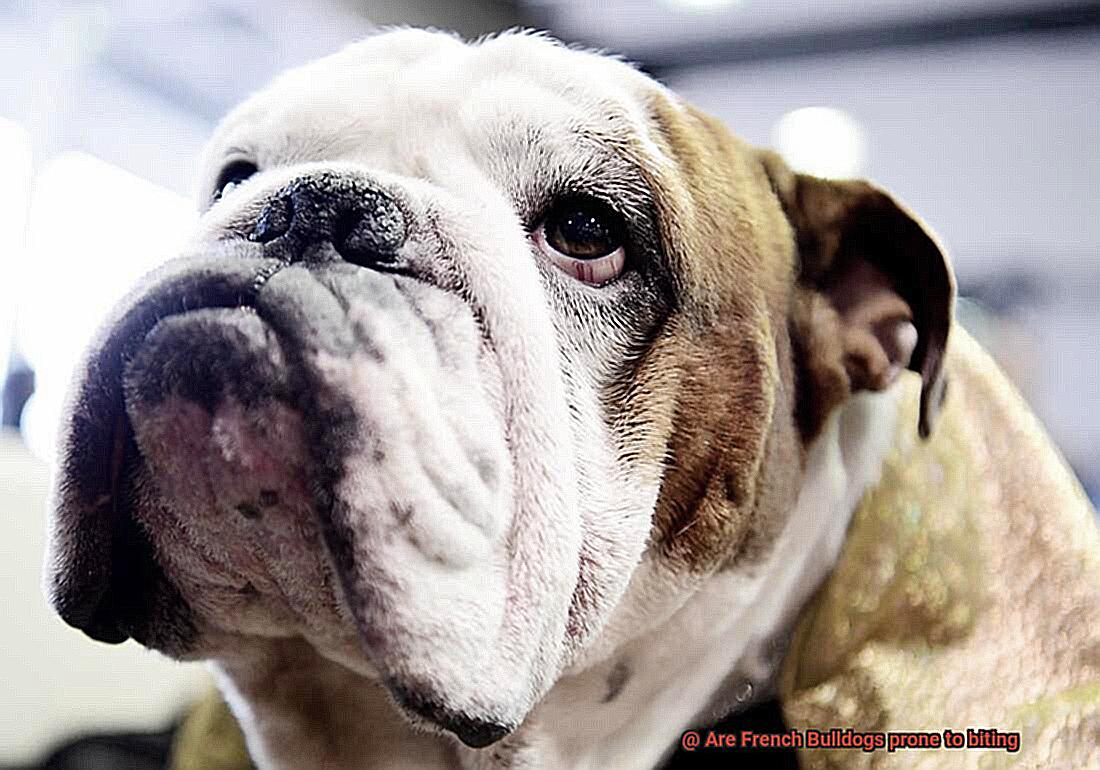Are French Bulldogs prone to biting?
Choosing the perfect furry sidekick is no easy task. And if you’ve fallen head over paws for the adorable and hilarious French Bulldogs, you might have heard some rumors about their supposed biting tendencies. But before we start pointing fingers, let’s embark on an exciting journey to separate fact from fiction.
In this blog post, we’ll dive deep into the world of French Bulldogs – those irresistibly chunky, bat-eared companions who have stolen hearts all around the globe. Together, we’ll uncover the truth about whether these lovable pooches are truly prone to biting or if it’s just a tall tale.
Get ready to challenge your preconceptions as we unravel the mysteries of French Bulldog behavior and explore the factors that may contribute to their potential nipping habits. Join us on this captivating adventure where we’ll delve into their temperament, training needs, and debunk any misconceptions about their biting tendencies.
So grab yourself a steaming cup of coffee, kick back, and let’s embark on a delightful expedition to uncover the truth about French Bulldogs and their alleged penchant for sinking their teeth into things.
Understanding the Factors That Contribute to Biting Behavior in French Bulldogs
Contents
- 1 Understanding the Factors That Contribute to Biting Behavior in French Bulldogs
- 2 Fear and Anxiety: How Can Owners Help Reduce the Risk of Biting?
- 3 Pain and Discomfort: Recognizing Signs of Health Issues in French Bulldogs
- 4 Lack of Training and Socialization: The Impact on Biting Behavior
- 5 Aggression as a Genetic Trait in Some French Bulldogs
- 6 Tips for Potential Owners When Choosing a Breeder
- 7 Early Socialization and Training as a Preventative Measure
- 8 Understanding Appropriate Bite Inhibition for French Bulldogs
- 9 Conclusion
French Bulldogs are known for their friendly and sociable nature, making them popular pets. However, like any dog, French Bulldogs can exhibit biting behavior under certain circumstances. As responsible owners, it is crucial to understand the factors that contribute to biting incidents in order to prevent them and create a safe environment for both your Frenchie and your family.
Genetics and Breed Characteristics:
French Bulldogs have a unique genetic makeup that influences their behavior. Some research suggests that certain genes associated with aggression may be more prevalent in this breed. Additionally, their breed characteristics, such as a strong prey drive or protective instincts, can contribute to biting tendencies.
Socialization and Early Experiences:
Proper socialization during the critical developmental stages plays a vital role in shaping a Frenchie’s behavior. Lack of early socialization or negative experiences can lead to fear or aggression, increasing the risk of biting. Early exposure to different people, animals, environments, and positive reinforcement training can mitigate biting tendencies.
Fear and Anxiety:
Like all dogs, French Bulldogs may resort to biting when they feel threatened or fearful. Identifying and addressing the underlying fear or anxiety triggers is essential to prevent biting episodes. Providing a safe environment and positive reinforcement training can help build their confidence and reduce fear-based aggression.
Resource Guarding:
Resource guarding is when a dog becomes protective over items like food, toys, or territory. Some French Bulldogs may exhibit resource guarding tendencies, leading to aggressive behaviors like biting when someone approaches their valued possessions. Proper training techniques focused on teaching sharing and desensitizing the dog to others’ presence around resources can manage this behavior.
Health Issues:
Underlying health problems, such as dental issues or musculoskeletal discomfort, can cause a typically docile Frenchie to exhibit aggressive behavior, including biting. Regular veterinary check-ups and prompt treatment of any health concerns are vital for preventing biting related to pain.
Lack of Training and Boundaries:
Consistent training and clear boundaries are essential for French Bulldogs to understand acceptable behavior. Inadequate training or inconsistent rules can lead to confusion and frustration, increasing the likelihood of biting. Positive reinforcement training methods can effectively teach appropriate behaviors and discourage biting.
Behavioral Issues and Aggression:
Some French Bulldogs may have underlying behavioral issues or aggression problems that contribute to biting behavior. Consulting with a professional dog behaviorist or trainer experienced in aggression cases can help identify root causes and develop a tailored behavior modification plan.
Fear and Anxiety: How Can Owners Help Reduce the Risk of Biting?
French Bulldogs, like any other breed, can sometimes exhibit fear and anxiety, which may lead to biting behavior. As responsible owners, it is important to understand the triggers and signs of fear and anxiety in our French Bulldogs, and take proactive measures to reduce the risk of biting. In this guide, we will explore effective strategies that can help create a safe and secure environment for our furry friends.
- Recognize the signs of fear and anxiety: It is crucial to be aware of the signs that indicate our French Bulldogs are feeling fearful or anxious. These signs may include trembling, panting, excessive drooling, hiding, or aggression. By recognizing these signs early on, we can intervene before the situation escalates.
- Provide a safe and secure environment: Creating a safe space for our French Bulldogs is essential. Ensure they have a comfortable area where they can retreat when feeling fearful or anxious. This can be a designated quiet room or a cozy crate where they feel secure.
- Stick to a routine: Dogs thrive on consistency, so maintaining a regular schedule for feeding, exercise, and playtime can promote a sense of security. A predictable routine helps alleviate anxiety and provides structure in their daily lives.
- Socialize from an early age: Socialization plays a significant role in reducing fear and anxiety. Introduce your French Bulldog to various people, animals, and environments at an early age to help them become more confident and less prone to fearful reactions.
- Positive reinforcement training: Use positive reinforcement techniques to build trust and confidence in your French Bulldog. Reward-based training methods can help create a positive association with certain situations or stimuli that may otherwise trigger fear or anxiety.
- Regular physical exercise: Engage in regular physical exercise with your French Bulldog to promote mental well-being. Physical activity helps release pent-up energy and reduces stress levels, promoting overall calmness and reducing the likelihood of aggressive behavior.
- Seek professional help if needed: In severe cases of fear and anxiety, it may be necessary to seek professional help from a veterinarian or dog behaviorist. These experts can provide guidance on behavior modification techniques or recommend appropriate medications if deemed necessary.
- Remain calm and composed: When your French Bulldog displays signs of fear or anxiety, it is crucial to remain calm and composed. Reacting with anger or punishment can escalate the situation and potentially lead to biting. Instead, offer reassurance, use soothing tones, and provide comfort to help your dog feel safe and secure.

Pain and Discomfort: Recognizing Signs of Health Issues in French Bulldogs
French Bulldogs are adorable, lovable pets that bring joy and companionship to their owners. However, like any other breed of dog, they can experience pain and discomfort due to various health issues. As a French Bulldog owner, it is important to be able to recognize the signs of pain and discomfort in your furry friend so that you can provide the necessary care and seek veterinary attention if needed.
Hip Dysplasia:
Hip dysplasia is a common health issue in French Bulldogs. It occurs when the hip joint does not develop properly, leading to instability and discomfort. Some signs that your French Bulldog may be experiencing hip dysplasia include:
- Difficulty walking or getting up
- Limping or favoring one leg
- Reluctance to engage in physical activity

Intervertebral Disc Disease:
Another health issue that can cause pain in French Bulldogs is intervertebral disc disease. This condition occurs when the discs between the vertebrae in the spine become compressed or herniated, putting pressure on the spinal cord. Signs of intervertebral disc disease may include:
- Difficulty walking
- Dragging of the hind legs
- Yelping or whimpering when touched or moved
Brachycephalic Airway Syndrome:
French Bulldogs are also prone to respiratory issues, such as brachycephalic airway syndrome. This condition is characterized by narrowed airways, making it difficult for the dog to breathe properly. Signs of respiratory issues may include:
- Wheezing or snoring
- Excessive panting
- Difficulty breathing during exercise or in hot weather

Skin Allergies and Sensitivities:
Additionally, French Bulldogs are susceptible to skin allergies and sensitivities. These can cause itching, redness, rashes, and hair loss. Signs of skin allergies may include:
- Excessive scratching or biting at the skin
- Rubbing against furniture or carpets
It is important for owners to regularly check their French Bulldogs for any signs of pain or discomfort. This includes observing their behavior, checking for changes in appetite or water intake, and examining their body for any abnormalities or signs of injury. If you notice any concerning signs or suspect that your French Bulldog is experiencing pain or discomfort, it is essential to seek veterinary attention.
A veterinarian will be able to properly diagnose the issue and recommend appropriate treatment options, such as medication, physical therapy, or surgery. Providing a comfortable and safe environment for your French Bulldog is also crucial in preventing pain and discomfort. This includes providing them with a soft and supportive bed, keeping them at a healthy weight to reduce strain on their joints, and avoiding activities or situations that may exacerbate their health issues.

Lack of Training and Socialization: The Impact on Biting Behavior
French Bulldogs are known for their charming personalities and affectionate nature. However, like any other dog breed, they can exhibit biting behavior if they lack proper training and socialization. It is essential for owners to understand the connection between these factors and biting behavior in order to prevent potential issues and ensure a well-behaved and sociable pet.
Lack of training refers to a dog’s inability to understand and follow basic commands. When French Bulldogs are not trained adequately, they may become confused or anxious in certain situations. This can lead to defensive biting as a way to protect themselves from perceived threats. It is crucial for dog owners to start training their French Bulldogs from an early age, using positive reinforcement methods. Rewarding good behavior with treats or praise can be highly effective in teaching them appropriate behaviors and reducing the likelihood of biting incidents.
Socialization, on the other hand, refers to a dog’s exposure to different people, animals, and environments. Puppies that are not properly socialized during their critical period (between 3 and 14 weeks of age) may develop behavioral issues, including biting. By exposing French Bulldogs to various stimuli in a positive and controlled manner, owners can help them become more confident and comfortable in different situations. Puppy classes, obedience training, and supervised playdates can provide opportunities for socialization.
Consistency is key when it comes to training and socialization. Dog owners must reinforce desirable behaviors consistently throughout their French Bulldog’s life to maintain good manners and prevent biting incidents. It is important to note that punishment or harsh training methods can exacerbate fear or anxiety issues and may lead to more aggressive behavior. Positive reinforcement is always the best approach.
If a French Bulldog’s biting behavior persists despite training and socialization efforts, seeking professional help from a certified dog trainer or behaviorist can be beneficial. These professionals have the expertise to assess the situation and provide tailored guidance to address the underlying causes of the biting behavior.
Aggression as a Genetic Trait in Some French Bulldogs
Today, we’re going to dive into the fascinating world of aggression in French Bulldogs. While these lovable pups are known for their friendly and affectionate nature, it’s important to acknowledge that aggression can be a genetic trait in some individuals. But fear not. By understanding the role of genetics, environment, and responsible ownership, you can ensure a happy and non-aggressive furry companion.
Genetics: The Aggression Connection
Just like humans, dogs inherit certain traits from their parents, including aggression. In some French Bulldogs, specific genetic factors may contribute to a higher propensity for aggressive behavior. This is why responsible breeders carefully select dogs for breeding to avoid passing on aggression-related genes. So, choosing a reputable breeder who prioritizes temperament is crucial in reducing the likelihood of owning an aggressive Frenchie.
Environmental Influences: Nature vs. Nurture
While genetics play a significant role, environment also shapes a dog’s behavior. French Bulldogs that are raised in a nurturing and positive environment are less likely to exhibit aggression. Early socialization is key. Introduce your Frenchie to various people, animals, and environments from an early age to help prevent aggression from developing or becoming problematic.
Training: Positive Reinforcement is Paw-some.
When it comes to training your French Bulldog, positive reinforcement is the way to go. Harsh or punitive training techniques can worsen aggression in any breed, including French Bulldogs. Instead, reward good behavior with treats, praise, and belly rubs. With patience and consistency, you’ll have a well-mannered and non-aggressive Frenchie.
Seeking Professional Help: The Expert Touch

If you notice any signs of aggression in your French Bulldog, don’t hesitate to seek guidance from professional trainers or behaviorists experienced in working with this breed. They can provide valuable insights and techniques to manage and modify aggressive behaviors effectively.
Responsible Ownership: The Key to Harmony
Remember, aggression is not solely determined by genetics but is also influenced by environmental factors and owner handling. Responsible ownership entails understanding the breed’s characteristics and needs, providing proper training and socialization, and seeking professional help when necessary. By taking these proactive steps, you can minimize the risk of aggression in your French Bulldog and foster a harmonious relationship.
Tips for Potential Owners When Choosing a Breeder
Choosing the right breeder is crucial when looking for a French Bulldog puppy. A responsible and reputable breeder will provide you with a healthy and well-adjusted puppy that will become a beloved member of your family. Here are some tips to help you make an informed decision and find the perfect breeder for your French Bulldog:
Research and Reputation:
Start by researching breeders in your area and check their reputation. Look for breeders who are registered with reputable kennel clubs and have positive reviews from previous puppy buyers. Reputable breeders will have a good track record of producing healthy and well-socialized puppies.

Visit the Breeder’s Facility:
If possible, visit the breeder’s facility to see how the dogs are raised and cared for. A responsible breeder will have clean living conditions, provide proper nutrition, and offer veterinary care to their dogs. Pay attention to the overall environment and ensure that it is conducive to the well-being of the dogs.
Temperament and Behavior:
Ask the breeder about the temperament and behavior of their dogs. A reputable breeder will be knowledgeable about the breed’s characteristics and should be able to provide information about the temperament of both the sire and dam of the puppies. Interact with the puppies and observe their behavior to ensure they are well-socialized.
Health Testing:
Inquire about any health testing that has been done on the parents. French Bulldogs are prone to certain health issues, so it is important that the breeder conducts health screenings on their breeding dogs to minimize the risk of passing on genetic conditions to the puppies.
Socialization Efforts:
Ask about the socialization efforts made with the puppies. Early socialization is crucial for French Bulldogs to develop into well-rounded adults. A good breeder will expose the puppies to different experiences from a young age to help them adjust to new situations.
References and Questions:
Request references from previous puppy buyers to get insights into their experience with the breeder. Be prepared to answer the breeder’s questions as well. A responsible breeder will want to ensure that their puppies are going to a good home and may ask about your lifestyle and expectations for owning a French Bulldog.
Early Socialization and Training as a Preventative Measure
French Bulldogs are known for their affectionate and friendly nature, but like any other breed, they can exhibit biting behavior if not properly socialized and trained from a young age. In this blog post, we will explore the importance of early socialization and training as a preventative measure against biting behavior in French Bulldogs.
Why is Early Socialization Important?
Early socialization involves exposing your French Bulldog to various people, animals, environments, and situations to help them develop positive associations and learn appropriate behaviors. By introducing them to different experiences early on, you can help them become more confident and less likely to resort to biting when faced with unfamiliar or stressful situations.
Tips for Effective Socialization:
- Start Early: Ideally, socialization should begin between 8-12 weeks of age when your French Bulldog is still a puppy and more receptive to new experiences.
- Gradual Exposure: Introduce your puppy to different people, animals, and environments gradually. Start with calm and controlled interactions and gradually increase the level of complexity.
- Positive Associations: Use treats, praise, and rewards to create positive associations with new experiences. This will help your French Bulldog view them as enjoyable rather than threatening.
- Puppy Classes: Enroll your French Bulldog in puppy classes where they can interact with other dogs under the guidance of a professional trainer. This will provide structured socialization experiences and help them learn appropriate play behavior.
The Power of Training:
Training is another essential aspect of preventing biting behavior in French Bulldogs. By teaching them basic commands, proper manners, and boundaries, you can establish clear rules and expectations for your furry friend.
Tips for Effective Training:
- Consistency is Key: Be consistent in your training methods and expectations. Use the same commands and gestures consistently to avoid confusion.
- Positive Reinforcement: Reward your French Bulldog with treats, praise, and playtime when they display good behavior. Positive reinforcement encourages them to repeat the desired actions.
- Seek Professional Guidance: Consider working with a professional dog trainer who specializes in positive reinforcement training methods. They can provide expert guidance and address any specific behavioral concerns.
Conclusion:
Early socialization and training are essential in preventing biting behavior in French Bulldogs. By exposing them to various experiences and teaching them appropriate behaviors, you can raise a well-behaved and sociable companion. Remember to start early, be consistent, and seek professional guidance when needed. With these preventative measures in place, you can enjoy a harmonious relationship with your French Bulldog for years to come.
Understanding Appropriate Bite Inhibition for French Bulldogs
The French Bulldog – a breed known for their friendly nature and adorable squishy faces. But like any other dog, Frenchies have the potential to bite if not properly trained and socialized. Don’t worry though, with a little understanding and some pawsitive techniques, you can nip this problem in the bud.
Puppy Power: Learning Bite Inhibition from the Pack
Did you know that puppies naturally learn bite inhibition from their littermates and mother during playtime? It’s true. They learn to control the strength of their bite by receiving feedback from their siblings when play gets too rough. But when you bring your Frenchie pup home, it’s up to you to continue this training.
Socialization- The Key Ingredient
Socialization is the secret sauce when it comes to preventing biting behavior in French Bulldogs. By exposing your pup to different people, animals, and environments, you’re helping them become more comfortable and less likely to resort to defensive or fearful biting.
Chew on This: Redirecting Biting Behavior
French Bulldogs love to chew, so make sure you provide appropriate chew toys for your furry friend. When your pup starts nibbling on your fingers or toes, redirect their attention to their toys instead. This helps them understand what is acceptable to chew on and what is off-limits.
Reacting Appropriately
During playtime, if your Frenchie bites too hard, it’s important to react appropriately. Let out a yelp or make a high-pitched sound to mimic how a littermate would react to rough play. This lets your pup know that their biting was too much for you. Remember not to punish your pup for biting but instead redirect their attention to an appropriate toy or activity.
The Power of Consistency
Consistency is key in reinforcing good behavior and discouraging biting. Make sure everyone in your household is on the same page when it comes to training and enforcing boundaries. By consistently redirecting your pup’s biting behavior and providing positive reinforcement for good behavior, you’ll be well on your way to having a well-mannered Frenchie.
Seeking Professional Help
If you’re having trouble with bite inhibition training, don’t hesitate to seek professional guidance. Training classes or a consultation with a professional trainer can provide you with valuable tips and techniques tailored to your Frenchie’s needs.
When Biting Becomes a Big Deal
It’s important to note that biting can sometimes be a result of fear, anxiety, or pain. If your French Bulldog is exhibiting aggressive biting behavior, it’s essential to consult with a veterinarian or animal behaviorist to rule out any underlying medical or behavioral issues.
EO1ndEC6MvM” >
Conclusion
In conclusion, it is important to note that French Bulldogs are not inherently prone to biting.
While they may exhibit occasional nipping or mouthing behaviors during their puppy stage, proper training and socialization can help curb these tendencies. It is crucial for owners to establish clear boundaries and provide consistent positive reinforcement to discourage any aggressive behavior.
Additionally, early detection of any signs of fear or anxiety in French Bulldogs can prevent potential biting incidents.




